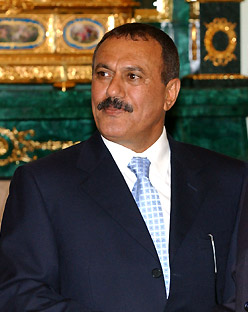
Ali Abdullah Saleh al-Ahmar was a Yemeni politician who served as the first President of Yemen, from Yemeni unification on 22 May 1990 to his resignation on 25 February 2012, following the Yemeni Revolution. Previously, he had served as President of the Yemen Arab Republic, or North Yemen, from July 1978 to 22 May 1990, after the assassination of President Ahmad al-Ghashmi.
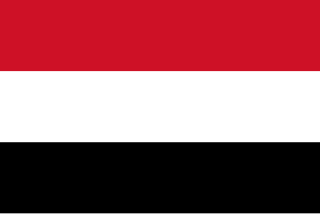
Yemen, officially the Republic of Yemen, is a country in Western Asia. It is situated on the southern end of the Arabian Peninsula, and borders Saudi Arabia to the north and Oman to the northeast and shares maritime borders with Eritrea, Djibouti, and Somalia. Yemen is the second-largest Arab sovereign state in the peninsula, occupying 555,000 square kilometres, with a coastline stretching about 2,000 kilometres. Its constitutionally stated capital, and largest city, is Sanaa. As of 2021, Yemen has an estimated population of 30.4 million.

Ali Salem al-Beidh is a Yemeni politician who served as the General Secretary of the Yemeni Socialist Party (YSP) in South Yemen and as Vice President of Yemen following the unification in 1990. He left the unification government in 1993, sparking the 1994 civil war in Yemen and then went into exile in Oman. He is a leader of the Southern independence movement known as Al Hirak.
The Houthi insurgency in Yemen, also known as the Houthi rebellion, the Sa'dah War, or the Sa'dah conflict, was a military rebellion pitting Zaidi Shia Houthis against the Yemeni military that began in Northern Yemen and has since escalated into a full-scale civil war. The conflict was sparked in 2004 by the government's attempt to arrest Hussein Badreddin al-Houthi, a Zaidi religious leader of the Houthis and a former parliamentarian on whose head the government had placed a $55,000 bounty.

In the years after the September 11, 2001 attack on the World Trade Center in New York City, Yemen became a key site for U.S. intelligence gathering and drone attacks on Al-Qaeda. According to the 2012 U.S. Global Leadership Report, 18% of Yemenis approved of U.S. leadership, with 59% disapproving and 23% uncertain. According to a February 2015 report from the Congressional Research Service, U.S. officials considered Al-Qaeda in the Arab Peninsula the Al-Qaeda affiliate "most likely to attempt transnational attacks against the United States."

The Al-Qaeda insurgency in Yemen is an ongoing armed conflict between the Yemeni government, the United States and their allies, and al-Qaeda-affiliated cells in Yemen. It is a part of the Global War on Terror.
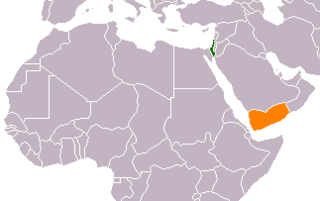
There are no diplomatic relations that exist between Israel and Yemen and relations between the two countries are very tense. Yemen refuses the admission of people with an Israeli passport or any passport with an Israeli stamp, and the country is defined as an "enemy state" by Israeli law.

Abdrabbuh Mansur Hadi is a Yemeni politician and former field marshal of the Yemeni Armed Forces who served as the president of Yemen from 2012 until 2022, when he stepped down and transferred executive authority to the Presidential Leadership Council, with Rashad al-Alimi as its chairman. He was the vice president to Ali Abdullah Saleh from 1994 to 2012.

The Yemeni Revolution (intifada), also known as the Yemeni Revolution of Dignity followed the initial stages of the Tunisian Revolution and occurred simultaneously with the Egyptian Revolution of 2011 and other Arab Spring protests in the Middle East and North Africa. In its early phase, protests in Yemen were initially against unemployment, economic conditions and corruption, as well as against the government's proposals to modify Yemen's constitution. The protesters' demands then escalated to calls for the resignation of Yemeni President Ali Abdullah Saleh. Mass defections from the military, as well as from Saleh's government, effectively rendered much of the country outside of the government's control, and protesters vowed to defy its authority.

Tawakkol Abdel-Salam Khalid Karman is a Yemeni Nobel Laureate, journalist, politician, and human rights activist. She leads the group "Women Journalists Without Chains," which she co-founded in 2005. She became the international public face of the 2011 Yemeni uprising that was part of the Arab Spring uprisings. In 2011, she was reportedly called the "Iron Woman" and "Mother of the Revolution" by some Yemenis. She is a co-recipient of the 2011 Nobel Peace Prize, becoming the first Yemeni, the first Arab woman, and the second Muslim woman to win a Nobel Prize.
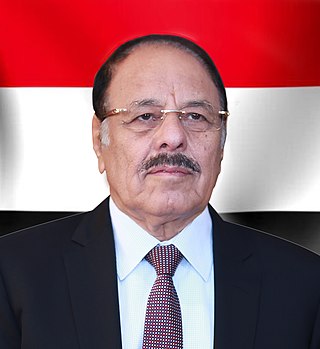
Ali Mohsen Saleh al-Ahmar, sometimes spelled "Muhsin", is a Yemeni military officer who served as the vice president of Yemen from 2016 to 2022, when he was dismissed by President Abdrabbuh Mansur Hadi, who transferred the powers of the president and vice president to the Presidential Leadership Council. He is a general in the Yemeni Army and was the commander of the northwestern military district and the 1st Armoured Division. He played a leading role in the creation of the General People's Congress.

The Battle of Sanaa was a battle during the 2011 Yemeni uprising between forces loyal to Yemeni leader Ali Abdullah Saleh and opposition tribal forces led by Sheikh Sadiq al-Ahmar for control of the Yemeni capital Sanaa and, on the part of the opposition, for the purpose of the downfall of president Saleh.

The following is a timeline of the 2011 Yemeni revolution from January to 2 June 2011. The Yemeni revolution was a series of major protests, political tensions, and armed clashes taking place in Yemen, which began in January 2011, influenced by concurrent protests in the region. Hundreds of protesters, members of armed groups, army soldiers and security personnel were killed, and many more injured, in the largest protests to take place in the South Arabian country for decades.
The international reactions to the Yemeni Revolution were not as pronounced as reactions to similar events during the Arab Spring, but a number of governments and organisations made statements on Yemen before and after the departure of longtime President Ali Abdullah Saleh from power in February 2012.
Abdul-Malik Badruldeen al-Houthi is a Yemeni politician and religious leader who serves as the leader of the Houthi movement, a revolutionary movement principally made up of Zaidi Muslims. His brothers Yahia and Abdul-Karim are also leaders of the group, as were his late brothers Hussein, Ibrahim, and Abdulkhaliq. Abdul-Malik Houthi is the leading figure in the Yemeni Civil War which started with the Houthi takeover in Yemen in the Saada Governorate in northern Yemen.

The Houthi takeover in Yemen, also known as the September 21 Revolution, or 2014–15 coup d'état, was a popular revolution against Yemeni President Abdrabbuh Mansur Hadi led by the Houthis and their supporters that pushed the Yemeni government from power. It had origins in Houthi-led protests that began the previous month, and escalated when the Houthis stormed the Yemeni capital Sanaa on 21 September 2014, causing the resignation of Prime Minister Mohammed Basindawa, and later the resignation of President Abdrabbuh Mansur Hadi and his ministers on 22 January 2015 after Houthi forces seized the presidential palace, residence, and key military installations, and the formation of a ruling council by Houthi militants on 6 February 2015.
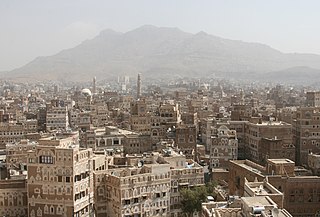
The Battle of Sanaa in 2014 marked the advance of the Houthis into Sanaa, the capital of Yemen, and heralded the beginning of the armed takeover of the government that unfolded over the following months. Fighting began on 9 September 2014, when pro-Houthi protesters under the command of Abdul-Malik al-Houthi marched on the cabinet office and were fired upon by security forces, leaving seven dead. The clashes escalated on 18 September, when 40 were killed in an armed confrontation between the Houthis led by military commander Mohammed Ali al-Houthi and supporters of the Sunni hardliner Islah Party when the Houthis tried to seize Yemen TV, and 19 September, with more than 60 killed in clashes between Houthi fighters and the military and police in northern Sanaa. By 21 September, the Houthis captured the government headquarters, marking the fall of Sanaa.

The aftermath of the Houthi takeover in Yemen refers to developments following the Houthis' takeover of the Yemeni capital of Sana'a and dissolution of the government, which eventually led to a civil war and the Saudi Arabian-led intervention in Yemen.
The Battle of Aden International Airport broke out in the early morning hours of 19 March 2015, when Yemen Army units loyal to former president Ali Abdullah Saleh attacked the airport in Aden, Yemen. The airport was defended by soldiers and guards supporting Abdrabbuh Mansur Hadi, Yemen's internationally recognised president.

On 26 March 2015, Saudi Arabia, leading a coalition of nine countries from West Asia and North Africa, launched an intervention in the Yemeni Civil War in response to calls from the president of Yemen Abdrabbuh Mansur Hadi for military support after he was ousted by the Houthi movement. The conflict ignited between the government forces, the Houthi rebels and other armed groups after the draft constitution and power-sharing arrangements collapsed, despite progress in the political transition led by the United Nations at that time, leading to an escalation of violence in mid-2014. The Houthis and allied units of the armed forces seized control of Sana’a and other parts of the country in September 2014 and in the following months. This prompted President Hadi to ask Saudi Arabia to intervene against the Iranian-backed Houthis.












